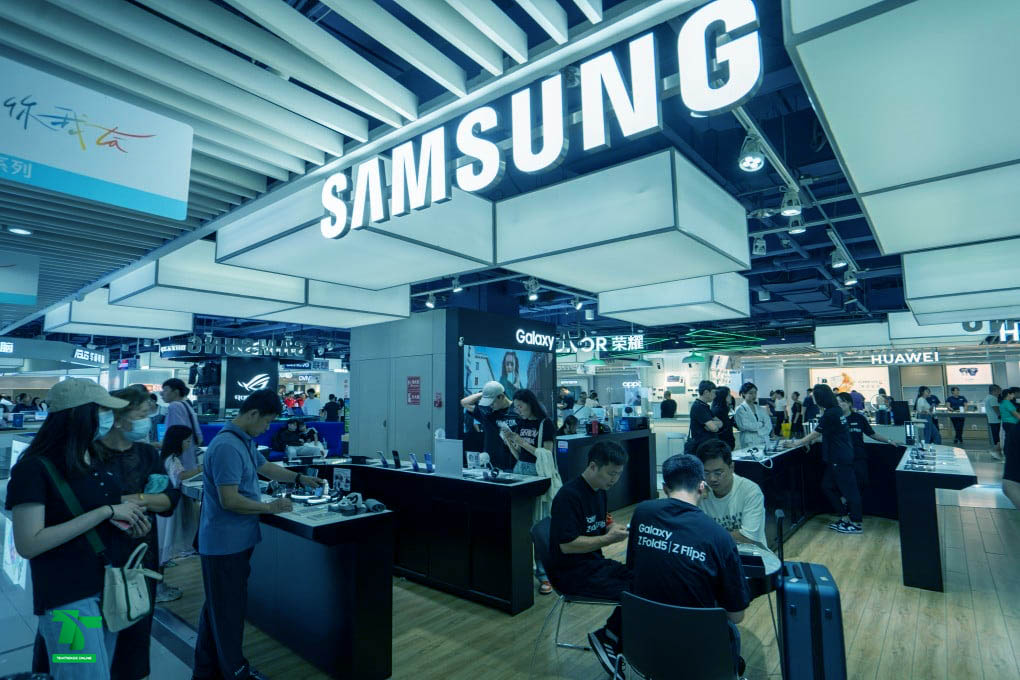On Friday, 20th December 2024, the United States Department of Commerce announced its finalized award of up to $4.75 billion for Samsung. This funding comes under the CHIPS (Creating Helpful Incentives to Produce Semiconductors) Act, a program designed to revitalize semiconductor production in the US.
A Strategic Initiative to Reduce Dependence on Foreign Manufacturers
The CHIPS Act was signed into law in August 2020 under President Joe Biden’s administration. The primary objective of this incentive program is to minimize the United States’ reliance on foreign semiconductor manufacturers. Over the last three decades, the nation’s semiconductor manufacturing capacity has drastically declined, dropping from 37% to 12%.
This significant dip in domestic production prompted the US government to take swift action to secure the supply chain for semiconductors—an essential component in various industries, from electronics to healthcare. By bolstering local production, the CHIPS Act aims to ensure the US maintains a competitive edge in the global semiconductor market.
The urgency to boost semiconductor manufacturing in the US intensified after global supply chain disruptions exposed vulnerabilities in the industry. The COVID-19 pandemic played a major role in amplifying these issues, leading to severe shortages that impacted several key industries, including automotive, consumer electronics, and healthcare.
For example, major car manufacturers such as Ford and General Motors were forced to halt production of certain vehicle models due to a lack of chips, leading to billions of dollars in losses. The automotive industry, which relies heavily on semiconductor chips for everything from engine control units to advanced driver-assistance systems, was among the hardest hit. This crisis underscored how dependent the US had become on foreign manufacturers, particularly in Taiwan and China, for semiconductor supplies.
Similarly, tech companies faced delays in manufacturing smartphones, laptops, and gaming consoles, affecting global product launches. Even the healthcare sector, which requires specialized chips for medical devices and diagnostic equipment, experienced setbacks. These disruptions emphasized the need for the US to regain control over its semiconductor production to ensure economic stability and national security.
By incentivizing companies like Samsung to establish and expand their semiconductor production facilities in the US, the government aims to mitigate risks associated with over-reliance on foreign suppliers. This move is also expected to strengthen the country’s technological leadership, ensuring that future advancements in artificial intelligence, quantum computing, and 5G infrastructure are not hindered by supply chain issues.
CHIPS Program Overview: Funding and Tax Incentives
The CHIPS Act has allocated approximately $40 billion in grants, loans, and loan guarantees, along with a 25% tax credit to encourage semiconductor manufacturers to invest in the United States. Samsung’s finalized award of $4.75 billion differs from the preliminary figure announced earlier this year. Which was $6.4 billion in April 2024.
In response to the adjustment in funding, Samsung revised its investment plans. The company reduced its planned investment from $45 billion to $37 billion. This revised funding plan will be utilized through the end of this decade, focusing on research, development, and production of semiconductors in the United States.
Market Conditions Drive Samsung’s Strategic Shift
In a recent interview, Samsung revealed that changes in the previously announced funding were heavily influenced by market conditions and the company’s investment priorities. Despite the reduction, Samsung remains optimistic about its investment strategy. Emphasizing its commitment to expanding and solidifying its leadership in the global semiconductor market.
Samsung is currently the world’s leading producer of memory chips and a key provider for companies that outsource semiconductor production. Its investment in the US signifies not only a commitment to strengthening its foothold in the market but also a step toward addressing the increasing global demand for semiconductors.
Samsung’s decision to reduce its planned investment reflects a combination of market realities and strategic adjustments. Initially, the company had set a higher investment target based on early projections for demand growth and government incentives. However, fluctuations in global semiconductor demand and rising production costs led to a reassessment of its strategy.
One major factor influencing Samsung’s investment recalibration is the intensified competition in the semiconductor space. Taiwan’s TSMC, the world’s largest contract chipmaker, has also announced multibillion-dollar investments in the US and other regions. Meanwhile, Intel, which has historically dominated the US semiconductor industry, is ramping up its own production capacity with backing from the CHIPS Act. These developments have forced Samsung to carefully allocate its resources to remain competitive.
Additionally, geopolitical uncertainties, particularly the ongoing US-China trade tensions, have further complicated long-term investment strategies. Given these challenges, Samsung is focusing more on targeted investments in research and advanced chip technology to maintain its leadership position.
Building Advanced Facilities for Future Growth
With an existing manufacturing facility in Austin, Samsung plans to build an advanced production facility in Taylor, Texas. This ambitious project will be segmented into multiple phases, with each milestone determining the release of allocated funding.
Compared to its counterpart, Texas Instruments, Samsung’s finalized award is less than initially anticipated. However, Samsung’s commitment to establishing state-of-the-art facilities underscores its long-term vision to remain at the forefront of semiconductor innovation.
Boosting the Local Economy and Creating Jobs
Samsung’s investment in Taylor and the expansion of its Austin facilities are expected to have a significant positive impact on the local economy. These projects will create thousands of job opportunities across various sectors, from construction to high-tech manufacturing.
Moreover, the local production of semiconductors will ensure that the US market can meet the growing demands of consumers and outsourcing companies. Industries such as electronics, medical equipment, smartphones, and computers rely heavily on semiconductor production to maintain smooth operations and innovation.
Samsung’s investment in Texas is set to generate thousands of jobs, but its impact extends beyond direct employment opportunities. The influx of workers, engineers, and corporate staff will drive demand for housing, transportation, and local businesses, providing a major economic boost to the region.
Local suppliers and contractors are also expected to benefit significantly. Companies specializing in semiconductor equipment, materials, and logistics will see increased demand for their services, further strengthening the domestic supply chain. Additionally, Samsung’s investment could encourage other high-tech firms to set up operations in Texas, transforming the state into a key semiconductor manufacturing hub.
Infrastructure development is another area where the investment will have long-term benefits. To support the expansion, local authorities may invest in improved roads, utilities, and public services, fostering regional economic growth. These developments will not only support Samsung’s operations but also create an environment conducive to further technological innovation and business expansion.
Supporting US Semiconductor Resilience: Other Key Investments
The Commerce Department has also allocated $1.61 billion to Texas Instruments to expand chip production. Additionally, $407 million has been awarded to Amkor Technology to support the development of a $2 billion advanced semiconductor packaging facility in Arizona.
These investments represent a broader effort to fortify the US semiconductor industry. By creating new job opportunities and meeting the rising demand for electronic devices. The CHIPS Act seeks to establish a more resilient semiconductor supply chain.

Advancing National Security and Economic Growth
Semiconductors play a critical role in national security, economic growth, and innovation in emerging technologies. By investing in domestic production, the US aims to reduce its vulnerability to supply chain disruptions caused by geopolitical tensions or natural disasters.
The CHIPS Act is not just about economic incentives—it is about securing the nation’s technological future. A robust semiconductor industry will enable the US to maintain its leadership in critical areas, including artificial intelligence, advanced computing, and defense systems.
The Global Implications of Samsung’s Investment
Samsung’s commitment to investing $37 billion in the US extends beyond the borders of the country. It sends a clear message to other global tech giants about the importance of diversifying manufacturing bases.
As the world’s top producer of memory chips, Samsung’s move to expand its US operations is likely to influence similar actions from other semiconductor manufacturers. This could lead to increased global competition and collaboration, ultimately benefiting the entire industry.
Addressing Industry Challenges with Innovation
While the CHIPS Act provides substantial financial incentives. The semiconductor industry faces several challenges, including high production costs, supply chain complexities, and the need for continuous innovation.
Samsung’s investment in research and development will be crucial in addressing these challenges. By leveraging cutting-edge technology, the company aims to improve manufacturing efficiency, reduce costs, and meet the ever-evolving demands of the market.
Strengthening US-South Korea Relations
Samsung’s expanded presence in the US also highlights the strong economic ties between the United States and South Korea. As one of South Korea’s largest conglomerates, Samsung’s investment reflects the mutual benefits of collaboration between the two nations.
This partnership is expected to foster greater economic and technological exchanges, paving the way for future joint initiatives in the tech sector.
Samsung’s expanded presence in the US highlights the deepening economic and technological ties between the United States and South Korea. This investment represents more than just business growth—it reinforces the strategic partnership between the two nations in semiconductor production, an industry critical to both economies.
Historically, South Korea and the US have collaborated in various sectors, including defense, trade, and technology. With the global semiconductor industry becoming more geopolitically significant, this partnership is expected to evolve further. Samsung’s expansion could pave the way for increased cooperation in next-generation chip development, artificial intelligence, and cybersecurity.
Additionally, the move is likely to encourage other South Korean firms to explore opportunities in the US, strengthening bilateral trade relations. As semiconductor demand continues to rise, fostering strong international partnerships will be key to ensuring a stable and secure global supply chain.
Looking Ahead: A Decade of Transformation
The CHIPS Act marks the beginning of a new era for the US semiconductor industry. With investments from companies like Samsung, Texas Instruments, and Amkor Technology, the next decade promises significant advancements in semiconductor production, research, and development.
For Samsung, the $4.75 billion funding represents more than just financial support—it is an opportunity to shape the future of technology. As the company continues to expand its operations in the US. It will play a pivotal role in driving innovation and strengthening the global semiconductor ecosystem.
Conclusion: A Step Toward Self-Reliance
The Department of Commerce’s award to Samsung is a testament to the US government’s commitment to revitalizing its semiconductor industry. By reducing reliance on foreign manufacturers and fostering domestic production, the CHIPS Act is laying the foundation for a more secure and prosperous future.
As the US semiconductor industry grows, so too will the opportunities for innovation, economic growth, and global leadership. For Samsung and the nation as a whole, the journey has only just begun.
Stay updated on technology news updates with Temtrends
Share:








